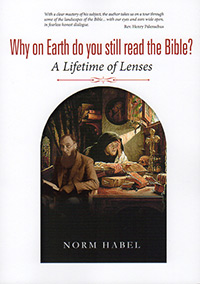 The Bible is the best and most challenging of books. You breathe it in. You’re shaped by it. You question it. You wrestle with it. At times you hear God as clear as a bell in it. At other times you can’t believe what you read, let alone connect it with your life. Many, many people have left churches because their life experience doesn’t connect with what they are being taught about what the Bible says. Retired Professor Norm Habel has provided a gem of a life story of how his reading and study of the Bible has changed and grown.
The Bible is the best and most challenging of books. You breathe it in. You’re shaped by it. You question it. You wrestle with it. At times you hear God as clear as a bell in it. At other times you can’t believe what you read, let alone connect it with your life. Many, many people have left churches because their life experience doesn’t connect with what they are being taught about what the Bible says. Retired Professor Norm Habel has provided a gem of a life story of how his reading and study of the Bible has changed and grown.
“Why on Earth do you still read the Bible?” is subtitled “A Lifetime of Lenses.” Norm’s book is a wonderful and challenging introduction to interpreting the Bible (hermeneutics). It is a story told through his life experience – 76 years in 100 pages. His personal story covers his family’s farm, seminary, teaching, church politics, culture (indigenous Australian and Indian), nature, and much more. In terms of interpretive lenses, he addresses multiple viewpoints – devotional, doctrinal, contextual, literally, symbolic, multi-source, indigenous, ecological and more.
Not surprisingly, given his scholarship, there is a focus on the Hebrew Scriptures or Old Testament. Norm’s cultural and ecological interests won’t be a surprise for those who know of his work. I first heard of him when I bought a book of his poems and prose in the early 1980’s, long before I knew that he was a professor. In his book as in his life, Norm runs the gamut from poet to prophet to professor to pray-er. He has been a gift to the church and hence a thorn in its heel at times (particularly his home church, the Lutherans).
I highly commend this book. It is well written and easy to read given the depth of its material. It is immediately useful in any hermeneutics class. I’d like every preacher to read it. While the book and chapters are brief, for many church members it will be a dive in the deep end unless they already have a sense that the Bible is more than what they think it is when they open it up. But that’s precisely what this gem of a little book should encourage people to do.
Thanks to Hugh and MorningStar Publishing for gifting this to us.
Leave a Reply